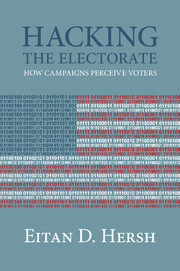Book contents
- Frontmatter
- Contents
- Acknowledgments
- 1 Introduction
- 2 The Perceived Voter Model
- 3 The Policy Roots of Elite Perceptions
- 4 Campaign Perceptions Quantified
- 5 The Perceived Partisan
- 6 The Public Code of Racialized Electioneering
- 7 Persuadable Voters in the Eyes of the Persuaders
- 8 Voters Perceived in Social Networks and Consumer Files
- 9 Conclusion
- Appendices
- Notes
- Bibliography
- Index
1 - Introduction
Published online by Cambridge University Press: 05 July 2015
- Frontmatter
- Contents
- Acknowledgments
- 1 Introduction
- 2 The Perceived Voter Model
- 3 The Policy Roots of Elite Perceptions
- 4 Campaign Perceptions Quantified
- 5 The Perceived Partisan
- 6 The Public Code of Racialized Electioneering
- 7 Persuadable Voters in the Eyes of the Persuaders
- 8 Voters Perceived in Social Networks and Consumer Files
- 9 Conclusion
- Appendices
- Notes
- Bibliography
- Index
Summary
What does an elected representative see when he or she sees a constituency? And, as a natural follow-up, what consequences do these perceptions have for his or her behavior?
– Richard Fenno, Home StyleOfficials of the modern state … assess the life of their society by a series of typifications that are always some distance from the full reality these abstractions are meant to capture … These typifications are indispensable to statecraft. State simplifications such as maps, censuses, cadastral lists, and standard units of measurement represent techniques for grasping a large and complex reality.
– James Scott, Seeing Like a StateIn the 1970s, political scientist Richard Fenno followed members of Congress on tours around their districts. Fenno observed how they interacted with voters so that he could study how politicians perceive their constituents and how these perceptions guide their behavior. As Fenno noticed, politicians have intuitions about which voters are supporters and which are opponents, what issues voters care about, and how the politicians ought to present themselves to the diverse audiences they encounter across their districts. But perceptions like these can be vague and distorted. Distorted as they may be, these perceptions guide politicians in their efforts to represent the public.
In contemporary politics, perceptions of voters are not merely vague ideas carried around in the heads of politicians; perceptions are also recorded in detailed electronic profiles that describe each constituent within a jurisdiction. As is now well known, political parties in recentyears have built databases to facilitate targeting strategies. These databases list the names and contact information for all voters in a district, along with information about their personal traits, their neighborhoods, and their history of political participation. Politicians and their campaigns use these lists to perceive the electorate. The lists help them understand who their supporters are, what issues different voters care about, and how they should present themselves to voters in their campaign appeals.
Information
- Type
- Chapter
- Information
- Hacking the ElectorateHow Campaigns Perceive Voters, pp. 1 - 23Publisher: Cambridge University PressPrint publication year: 2015
